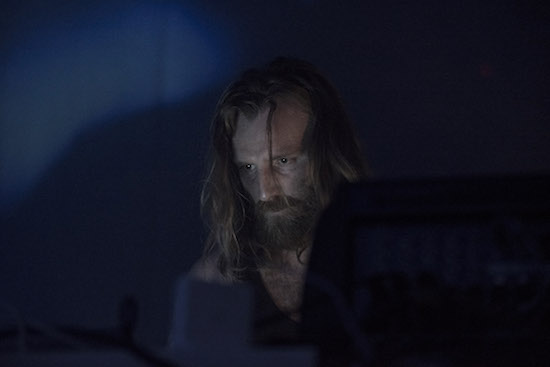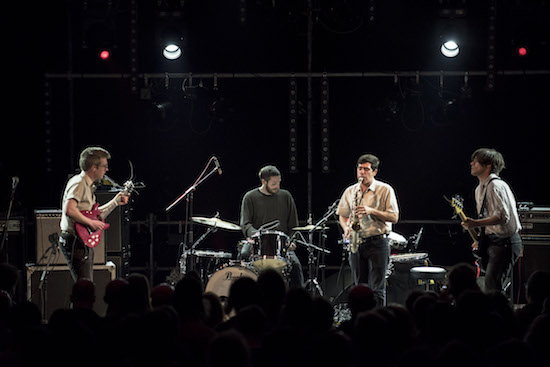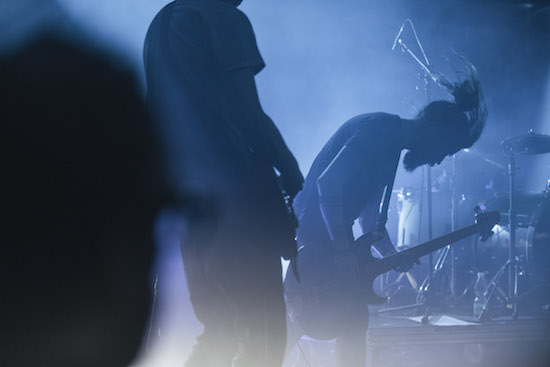Empathy is important
Nestled about an hour up the Danube river from Vienna, Krems is a confused town of multiple personalities in the centre of the Austrian countryside. On the one hand, it’s a lush tourist attraction deep in wine country, with middle class hordes flocking to the region to stumble from vineyard to vineyard throughout the long hot summers. Similarly it’s home to a downright beautiful university, and street after street of baroque homes and blossoming parks. On the flipside it’s also home to the Justizanstalt Stein, a real eyesore of a high security prison housing Austria’s most infamous criminals, not to mention being the sight of one of the nastiest massacres committed by Nazis during the closing acts of the Second World War. It’s a quiet, inbetween kind of place, its 25,000 inhabitants split almost perfectly down the middle politically – a microcosm for the ‘undecideds’ that rule these strange times. So it continues to makes as apt a setting as any for the Donaufestival (‘Donau’ simply being the German name for the Danube river), as multifaceted as any festival of its size in Europe.
The given theme to the 2017 programme is “Du steckst mich an” (literally “You infect me”), aiming to champion international empathy in light of what the festival describes as an era of “My Country First”. In that regard, I can instantly confirm Donaufestival to be a stonking success, with its programme of well balanced and gloriously diverse acts drawing a noticeably more enthusiastic crowd than last year to the town. Compared to Kraków’s Unsound, Berlin’s CTM, Barcelona’s Sónar, etc. etc., Donaufestival is relatively small and humble, taking place a full hour outside of the Austrian capital, turning this quiet & inbetweeny town for two weekends into something of a temporary enclave away from, well… all this modern mess.
Death can’t stop a great musician
The first act on the day I arrive is a performance of the Julius Eastman Memorial Dinner by Jace Clayton (better known under his pseudonym as DJ /rupture). For the uninitiated, Julius Eastman was a groundbreaking African-American minimalist composer who created music in the vein of Steve Reich et al and collaborated with Meredith Monk and Arthur Russell to name just a couple. His career nonetheless languished and failed due to myriad problems until he wound up homeless, eventually dying impoverished and alone at the age of 49 in 1990. Not only was Eastmen terrible at ‘playing the game’ when it came to the bureaucracy of the academic music sphere, he was both gay and black. Listeners during the years since Eastman’s passing have been much kinder to his music than his intolerant baby boomer contemporaries were, coming to a head with last year’s reissue of an incomplete recording of 1974 Eastman composition Femenine, topping many end-of-year lists.
Always one step ahead of the crowd, Jace Clayton first revived this pair of piano compositions by the late Eastman for an album in 2013, but renewed interest in the composer sees Clayton’s performance getting put on at several festivals this year, performed at Donaufestival in the magnificent church central to most of the festival’s daytime performances. Two pianists sit backs to the audience either side of Clayton, centre stage and manning some electronic gizmos processing the sounds from the pianos. They perform ‘Evil Nigger’ and ‘Gay Guerrilla’, two of Eastman’s better known (surviving) pieces, and the results are incredibly moving and gradually completely transportative. Endless pulses of piano notes and sparred phrases between the two players collide, while Clayton dabs and mixes up and blends in effects and electronics so gradually and subtly, the augmentation is only perceptible at sporadic moments. More than Reich or Riley and the like, the slow buildup and rich emotion of the music is more like a pared down Shostakovich symphony at ties.
In the centre between the two long piano pieces, and at the end, Clayton interacts with a projected video, acting out as if auditioning for an imagined ‘American Society of Eastman Supporters’. It’s more than a little bit funny, also cleverly highlighting the #problematic elements in picking up and ‘impersonating’ a deceased composer without any say, not to mention making a gentle dig at “Drinks Company Sponsorship” in the process. In effect, the resultant relationship between (deceased) composer and interpreter feels more like a collaboration.
In the same room the next weekend, This Is Not This Heat revive the music of This Heat, but imbue it with much more ensemble singing and strange spirituality than the legendary South Londoner’s rep would have you think they can muster. The loss of third founding member Gareth Williams in 2001 means that, as the title suggests, this certainly is not This Heat, but rather a sextet of musicians (including founding members Charles Bullen and Charles Hayward, plus Daniel O’Sullivan of Grumbling Fur) reimagining the original group’s dark-grey textured post-punk take on krauty rock experimentation. Classic rhythms like an impeccably recreated ‘24 Track Loop’ actually end up paling in comparison to the witchy power of the group sung compositions in the This Heat catalogue, Charles Hayward’s saff London tones sticking out like a sore ‘fumb’. It’s a gathering and a celebration rather than the laboratory experiment with rock music’s DNA their studio albums still sound like to this day.
We need more bands
If, as I have, you’ve spent the lion’s share of your days off in recent years poncing off around European music festivals, you’ll have noticed a massive increase in the prevalence of solo (largely electronic music) performers. Dudes and to a lesser extent gals, hunched over gear we can’t see, issuing noises from speakers. A large number of Donaufestival’s lineup fall into this camp, and many are amongst the very best in the game. Ben Frost closes out the second weekend with a tremendously heavy performance of new material full of scurrying noises punctuated mahoosive thuds that threaten to blow the heads of the unluckily enthusiastic kids right up at the front of the crowd. Shards of light melody puncture the surface later, lush synths appearing in the distance, and eventually some filtered beats too. It sounds like Frost’s finally drawing out the quick jabs of his Aurora album into far longer (and more satisfying) epics.

Swedish prodigy Klara Lewis, Viennese drone artist Dino Spiluttini, and Japanese wacky experimentalist Foodman all put in phenomenal showings for the artform too. Spiluttini’s set is particularly notable as taking place outside in the park at lunch time, tweeting birds and beating sunshine contrasting against his harsh tones. Foodman’s and Klara Lewis’ sets both head into many different directions, Lewis’ resembling a dark acid trip in front of her own homemade projections, while Foodman’s erratic set goes from breezy snappy footwork beats to exotica territory and bent MIDI brass stabs straight from Donkey Kond Country. Schizo doesn’t even cover it.
Despite the brilliance of said performers, the many guitar bands I’m somewhat surprised to see on the lineup leave the most lasting impression. If I were an NME writer I’d probably want to try and wax lyrical about how Gnod are British rock’s saviours… although it’s probably more accurate to describe as reinventing it. They’ve made a truly odd journey from space and hippy rockers to some hints of metal jazz, finally landing on their latest era of scuzzy Mark E Smith jams bathed in post-apocalyptic dread. It’s all built on repeated strums from two bassists, pure and simple like all good post-punk, but then the axes gather like we’re at a fucking execution. It reaches insanely heavy heights on the drawn out finale, the outfit riffing and riffing until there was nothing any of us in the audience could do, except nod.
Baltimore’s Horse Lords also play with the sort of prowess and energy a festival too many has been lacking of late, interleaving their molam-sounding, just intonation guitar and bass around hypnotising busy sax and drum rhythms. The audience response is one of the best of the festival save The Bug, all drunk dancing and wide grins.

Emptyset seem to straddle the divide, their new setup of a chugging self built zither and a drum amplified to truly insane heights. The tension is increased compared to their older setup, and the duo’s mastery of playing a space rather than their instruments pays off dividends. They have a responsive light show lighting up the innards of the church, and resultantly half the audience face inwards, or look upwards, or wander around the space, bathing in the frequencies like they’re sunbathing.
We need to talk about set length
Reduced to the duo of Greg Fox and Alexandra Drewchin (aka Eartheater) for some years now, free music group Guardian Alien explicitly cut their improvised set short after 30 quick minutes, Fox informing us he recently came to the conclusion that festival sets are getting way too long. Fox’s new ‘sensory percussion’ kit allows him to trigger samples and sounds with his drum kit, while Drewchin’s mastery at channeling her voice through a vocoder-like chain of effects creates a satanic monster of drones and crashes. The duo (also a couple) are intrinsically responsive too, and they collide voice and drums through the project’s well tested mix of tribalism and jittery free improv. Their initial half hour blast is more than enough, and once the thought’s been planted in my mind I can’t help but spend the rest of the festival wishin band’s finished 15 minutes early. I can’t tell if the plan backfires or works though, as Guardian Alien are the only group I see get such a huge amount of applause and cries of ‘Zugabe!’ that they come back out for an encore of freeform drums and voices. Julian Cope would fucking lose his shit.
Where’s all the politics
The elephant on the room is perhaps the state of politics around the world. Identity politics has become such a crowd-pleasing issue at these festivals that more specific attacks at, for example, the thinly veiled Neo-Nazis that have taken over governments in the UK and America (and at the time of the festival had not yet been defeated in France) are very much not in vogue. I’m not expecting somebody to pick up a bleedin’ acoustic guitar and start singing about the times “a-changin” for the worse like they have been – but the discussion still seems largely absent when it comes to the music programme. Donaufestival does have a parallel programme of theatrical performances and discussion which will naturally attack more head-on, but there’s some real anger in this snowflake nobody’s quite satisfying. Notable exceptions include Moor Mother. She plays one hell of a politically charged set in fact, addressing the audience directly about racial and class inequality, leading chants of “ring the alarm!” between raps and thuds of post-apocalyptic bass.
Then again, Gnod did just release an album called JUST SAY NO TO THE PSYCHO RIGHT-WING CAPITALIST FASCIST INDUSTRIAL DEATH MACHINE. Just cause you can’t hear it above the din, doesn’t mean the message to resist at any cost isn’t there. Similarly a duet improvisation between pedal steel player Heather Leigh and the one and only Peter Brötzmann seems to be channeling something verging on a post-apocalyptic vision of society in tatters. They’re knotted conversation has Brötzmann playing some of his most melodic parping alongside Leigh’s drawn out riffs, sounding more like the decaying corpse of a jazz club than the legendary sax player’s normal barrage of rough sonic abuse. The whole thing conjures visions of post-hellfire landscape, practically a hymn for Threads. It’s an exercise in delayed gratification too, eventually rewarding us with some paradisiacal tones as something of a waft of hopeful light in the closing moments. Then again when something’s as scarce as hope is right now, better use what you’ve got wisely.


